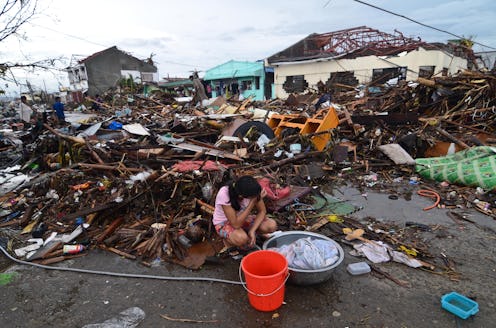News
What Countries Are Trying To Help Philippines?
In the six days since Typhoon Haiyan struck the Philippines head-on, residents of the city of Tacloban have been forced to pack into the Tacloban City Astrodome, a 5,000-seat arena. There, people have resorted to spreading out their rain-soaked possessions in the dome and defecating in its stairwells. Food stamps are being handed out for food that hasn't arrived yet, and salty water is procured from a broken pipe on the side of the road. There is no medicine or diapers for infants. As relief seems to trickle in, Astrodome squatters have little choice but to sit and wait. It's reminiscent of the situation facing New Orleans residents after Hurricane Katrina in 2005.
The United Nations announced Thursday that 4,460 people have been confirmed dead across the country, and there are hardly any relief workers to be found. Although President Benigno Aquino lowered the death count from a potential of 10,000 dead, the situation remains grim. Gas stations are shut down, making the transportation of relief supplies and medical personnel even harder.
"The choice is to use the same truck either to distribute food or collect bodies," said Tacloban mayor Alfred Romualdez.
In one area of Tacloban, there is reported to be a mass grave containing between 300 to 500 bodies. Only about 70 city government workers out of a normal 2,500 showed up for their jobs, the mayor says. Cell service is still spotty, but some people are using the hashtags #ReliefPH and #RescuePH to call for help in finding family members, alerting relief workers to places with less media coverage, and to issue pleas for their own families.
The United States has already pledged $20 million to help the relief efforts, and donated aircraft carrier USS George Washington and some Navy units. China announced $200,000 in aid from the government and Chinese Red Cross earlier in the week, but the country has since added $1.4 million in relief supplies like tents and blankets after coming some scrutiny for the "initially modest donation," as The New York Times puts it. Many believe China held back on funds due to its historically tense relations and territorial disputes with the Philippines.
Britain is sending a helicopter carrier, and Japan plans on deploying 1,000 troops, ships, and aircraft — which could end up being the country's biggest military deployment since World War II. The Philippines government has distributed 50,000 packs of rice and canned goods every day, aiding only about 3 percent of the almost 2 million families affected by Haiyan.
Bottom line: Right now, the Philippines needs money. Don't bother sending anything else — like construction supplies or clothing — because that could have detrimental ramifications for the local economy, says Kathleen Tierney, director of the Natural Hazards Center at the University of Colorado-Boulder:
Once you ship building materials halfway around the world, it turns out you've ruined the market for those in the area... If you want to see economic recovery, you don't want to send so many supplies that you create a situation where people can't survive in a business sense.
So when it comes to donations, we wonder, who is the most generous of them all? A new study has an interesting twist when it comes to gauging how charitable people are — and it may all come down to hunger.
Researchers at Aarhus University in Denmark knew that villagers throughout history used to share food in times of need, and wondered how this affects us in terms of political attitudes. They instructed students to fast for four hours, then gave half of them soda containing carbohydrates, and half were given artificial sweeteners. Students who had the artificial sweetener (causing lower blood glucose levels and more hunger) expressed more support for social welfare.
However, when the hungry groups were given actual money, they didn't share any more of it than when they were full. The researchers concluded that hunger makes people more likely to consider social welfare, though equally likely to donate monetary funds.
Does this mean richer countries less likely to cough up the dough for social welfare, i.e. disaster relief? The researchers disagree — and so do statistics about charitable giving. Last year, Americans donated more than $300 billion to charitable causes, an increase on the previous year. And individual people contributed to the majority of that amount: about $230 billion.
The World Giving Index ranks Australia as the most generous country in the world, with the United States placing 5th, and — rather surprisingly — Liberia, Iran and Oman rounding out the top 20. Guess who is ranked 17th? The Philippines. So even though the Philippines is in disaster mode right now, maybe it'll soon reap some karmic rewards.
